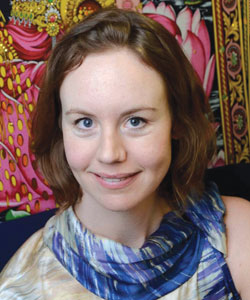Cristine Legare
 Director of the Cognition, Culture, and Development Lab
Director of the Cognition, Culture, and Development Lab
The University of Texas at Austin
www.cristinelegare.com
What does your research focus on?
My work reflects my commitment to interdisciplinary approaches to the study of cognitive development. My research program draws upon diverse theoretical and methodological insights from cognitive science, cultural psychology, cognitive anthropology, and education science, to examine the cognitive foundations of cultural learning. I have conducted extensive research in southern Africa, and am currently doing research in Brazil, China, Vanuatu (a Melanesian archipelago), and the United States.
What drew you to this line of research and why is it exciting to you?
The interplay of the universal human mind and the variation of human culture motivate my research program and spark my curiosity. Examining how our shared cognitive system facilitates our capacity to use cultural tools, to engage in cultural innovation, and also to become members of diverse cultural communities elucidates fundamental questions about the evolution of human social cognition.
Who were/are your mentors or scientific influences?
My undergraduate training in human development at the University of California, San Diego, was highly interdisciplinary and included coursework in cognitive science, cognitive anthropology, and cultural studies. I was profoundly influenced by theory in cultural psychology and cognitive anthropology. Research by Lev Vygotsky, Alexander Luria, Jean Lave, Sylvia Scribner, Jerome Bruner, Michael Cole, Barbara Rogoff, Patricia Greenfield, Tanya Luhrmann, Douglas Medin, Dan Sperber, Paul Rozin, Pascal Boyer, Rita Astuti, Richard Shweder, Celia Heyes, and Michael Tomasello has had a lasting impact on my intellectual interests. My undergraduate mentors, Gail Heyman and Sonja Baumer, introduced me to experimental methodology and research on social cognition, inspiring me to pursue a career in psychological research.
In graduate school, I participated in the Culture and Cognition Program while completing my PhD in developmental psychology at the University of Michigan. I am deeply grateful to my graduate advisor, Susan Gelman, for her exceptional mentorship and brilliant theoretical insight. My interest in reasoning about causality, an intellectual preoccupation of mine that underpins all of my research interests, was inspired by Henry Wellman, Alison Gopnik, Maureen Callanan, and Frank Keil. My collaboration with Harvey Whitehouse and Paul Harris has also had an invaluable influence on my current research on the evolution of social cognition.
What’s your future research agenda?
My future research agenda is to develop an innovative interdisciplinary, cross-cultural, and mixed-methodological approach for studying cultural transmission, a topic with far-reaching implications for understanding the interplay of cognition and culture in childhood. My goal is to develop an integrated cognitive developmental account of how children flexibly use imitative capacities as tools for cultural learning. To better understand how children navigate between different functions of imitation, I intend to examine how children determine when an event provides an opportunity for learning instrumental skills (based on physical causation) versus learning rituals (based on cultural convention). Understanding the development of rituals is integral to understanding key elements of social group behavior, including the achievement of coalitional goals, the experience of social ostracism, and how individuals negotiate social hierarchies.
What publication are you most proud of?
Legare, C. H. & Gelman, S. A. (2008). Bewitchment, biology, or both: The co-existence of natural and supernatural explanatory frameworks across development. Cognitive Science, 32, 607–642.
For my master’s thesis, I studied how individuals explain what causes AIDS in rural and urban South African populations (Legare & Gelman, 2008). This project represents my interest in using creative methodology to answer unorthodox, interdisciplinary research questions. I examined how the supernatural explanations (i.e. witchcraft) coexist with biological explanations in a context in which both traditional remedies (e.g., supernatural practices) and Western biomedical treatments are widely available. I found that supernatural and biological explanations provided distinct, complementary causal information. Witchcraft explanations were neither the result of ignorance nor replaced by biological explanations. Importantly, both biological and witchcraft explanations were used to explain precisely the same phenomena. Witchcraft explanations proved to be most common among adults, who were also most knowledgeable about biological causality. This research contributes to our understanding of how seemingly incompatible explanations coexist within individual minds across cultures and development. It supports the proposal that reasoning about supernatural phenomena is an enduring aspect of human cognition.





APS regularly opens certain online articles for discussion on our website. Effective February 2021, you must be a logged-in APS member to post comments. By posting a comment, you agree to our Community Guidelines and the display of your profile information, including your name and affiliation. Any opinions, findings, conclusions, or recommendations present in article comments are those of the writers and do not necessarily reflect the views of APS or the article’s author. For more information, please see our Community Guidelines.
Please login with your APS account to comment.